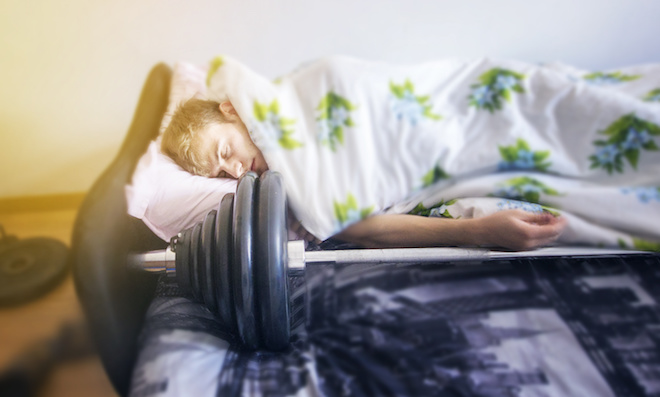You’ve been working hard lately at building your physique. Consistently hammering weights, getting your sweat going and emptying the endless plastic containers filled with protein, complex carbs and polyunsaturated fats. All the good stuff. Somehow your progress has been stuck at a road block for a while and you’re running out of ideas on how to get your physique to the next level. What to do, more weights, more food!? At this point, the grocery bill is starting to cost more than a mortgage. Perhaps it’s time to look someplace else? And I’m not talking about the next sexy new supplement that you’ll find on your favorite vitamin store’s shelf. In fact, it’s a lot more boring than that. What if the solution is right there in front of you, every morning? The question is; Are you sleeping enough? Could your sleep be better, deeper, more restorative?
Leptin to reduce your hunger cravings
There are many ways that sleep deprivation can negatively impact your fitness progress. You take your journey seriously so you must have realized by now the importance of tracking your calories, or at least possess some type of awareness about your food intake. Depriving yourself of a reasonable amount of sleep could be making this task much more difficult. Sleep deprivation decreases your levels of leptin, causing an increase in appetite post breakfast (Spiegel et al 2004). Leptin is a hormone predominantly produced by your fat cells to control your energy balance by inhibiting hunger. When you sleep less you make yourself vulnerable to lower levels of leptin production in your body. This can alter your judgement of satiety, impacting how much food you will need before you feel full. If sleeping more can help you gain better control over your appetite regulation, this might just make dieting a tiny bit easier.
Testosterone for lean muscle mass
“Well I’m not trying to lose weight”, you might say, “As a matter a fact, I’m bulking at the moment”. Well if you’re bulking, you’re definitely not trying to put on large amounts of fat. Your main goal is to build lean muscle. One key hormone involved in muscle protein synthesis (MPS), strength and bone density is the commonly known hormone testosterone. A study ran

8 nights with 5h of bedtime or less could cause a 10-15% decrease in testosterone production
on 10 healthy men, with an average age of 24 years old, demonstrated that 8 consecutive nights with 5h of bedtime (which is not uncommon at all in our modern society) could cause a 10-15% decrease in testosterone production (Leproult and Van Cauter 2011). That 10% might just be what it takes to make you number 1 rather than number 2.
Manage your glucose metabolism for better insulin sensitivity
Recent studies have started paying more attention to the impact of recurrent sleep deprivation (under sleeping for many nights) versus acute sleep loss (small amount of sleep for a single night). The negative impacts of acute sleep loss can be recovered quickly by just getting more sleep subsequent nights. It is more common though for people to experience partial sleep deprivation for days, even weeks a at time. Research on chronic sleep deprivation has been able to demonstrate a link with increased glucose tolerance (Kristen et al 2007). Glucose tolerance is a pre-diabetic state where your blood glucose levels are high, but not high enough for you to be diagnosed with diabetes. In this research, people with chronic sleep deprivation had a blood glucose clearance decrease by 40%. This could increase the risks of developing insulin resistance. Insulin has been well demonstrated to be involved in the metabolic pathways of muscle protein synthesis regulation (Scott et al 2002). As a result, developing a pre-diabetic state could decrease your anabolic potential and even lead to more serious health complications. Chronically cutting too much sleep might also imply that you have to cut that pre workout oats pancake out of your diet.
Additional Benefits
Besides the 3 points above, optimizing your sleep can have several additional benefits, Here is a spit fire list of just a few things that great sleep:

- Better insulin sensitivity – For a greater anabolic response
- Lower levels of cortisol – To prevent protein breakdown
- Better immune response – Allowing you to fight off those germs
- Reduced chronic inflammation – Improving your body composition
- Greater cognitive performance (mostly reaction time) – Increasing your focus during training session
just to name a few. In the words of Danny Lennon; “I challenge you to research any health problem and not find a correlation with sleep deprivation”. I’d like to assume that by now I have at least intrigued you enough to want to make a change to your sleeping habits. You may be wondering how to do it and where to start? Here’s a list of some of the points I have found to be the most cooperative with our modern lifestyle. Because, let’s be honest, no one can afford to live in a cave away from electronic devices and avoid stress at all cost. Also keep in mind that even though changing one variable is a great start, changing your habits in multiple areas will have the greatest benefits.
- Get your average of 8h of sleep: You can’t sleep better in a shorter amount of time. It has been demonstrated that the average person will need anywhere between 7.5 to 8.5 hours of sleep/night (Pardi 2014).
- Pay your sleep debt: The same studies have also demonstrated that after an extended period of chronic sleep deprivation there is manifestation of a sleep debt build up. The best way to reimburse this debt is by significantly increasing your sleep as much as you can. Eventually your body restores and 8h becomes more than enough to feel recovered. From the population in the study that had been sleep restricted chronically, some cases reported people sleeping up to 15h on the first consecutive nights before restoring to an average of 8h. I strongly advise you to start paying back that sleep debt on the weekend because unless you get to sleep at 7PM you might not make it on time to work the next day.
- Get your light-dark cycle in check: I will not go in depth to define the role of the circadian rhythm (this is a topic of another day) but understand the importance of having, ideally, natural light exposure during the day and minimum light exposure at night. This leads us to the two following points:
- Sleep in a pitch black dark room: this can promote much deeper sleep
- Consider investing in a pair of blue light blocker goggles: These glasses should be worn only before bed and have the ability to protect your retina (a part of your eye) from capturing the blue light from your electronic devices, which can give you a hard time falling asleep (also known as the iPad insomnia).
- Limit your caffeine consumption later in the day: If you have become caffeine tolerant, it might not keep you awake at night anymore, but it still has the potential to interfere with your sleep. Caffeine is an Adenosine antagonist. Your body produces Adenosine throughout the day when using energy (ATP). When you’re sleeping your body brings the level of Adenosine back to the baseline. Caffeine can decelerate the speed of this mechanism leading to a less restorative sleep.
So here you have it folks. Do not underestimate the influence a proper night’s sleep can have on your progress in the weight room. Time to turn the lights off and put some muscle mass on.

